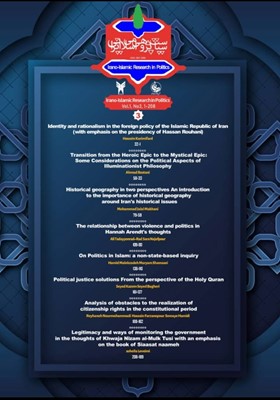Analysis of obstacles to the realization of citizenship rights in the constitutional period
Subject Areas : Political Developments in Iran
reyhaneh nourmohammadi
1
*
,
Hossain farzanepour
2
,
somaye hamidi
3
![]()
1 - Department of Political Science, Faculty of Literature and Humanities, Birjand University
2 - Department of Political Science, Faculty of Literature and Humanities, Birjand University
3 - Department of Political Science, Faculty of Literature and Humanities, Birjand University
Keywords: Qajar, Citizenship Rights, Brian S. Turner, constitutional revolution,
Abstract :
Citizenship rights is the most important contemporary legal issue and an emerging concept that has found a special place in social and political theories. Above all, citizenship rights discuss the rights, such as residence, education, and health, that everyone gets as a citizen of a state. Citizenship rights are realized when all members of the society achieve all civil and political rights and the citizen has responsibility as a member of the society along with the better management of the society and establishing social order and recognizing these interactive rights have an effective role in promoting citizenship rights and creating a society based on social order and justice. The present article, relying on the historical sociology approach based on Bryan.S.turner's theory, has tried to understand citizenship and citizenship rights in the constitutional era, by using library documents and resources and descriptive-analytical method by examining the obstacles to the realization . In this article, it is trying to answer the question that what were the factors and obstacles to the realization of citizenship rights in the constitutional era? The hypothesis of this research is that in the context of the weak central government, the weakness of the political culture of the mass of the people, the political elites did not ultimately lead to the formation of citizenship rights.
_||_

